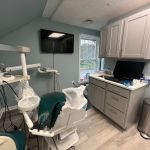How to Manage Toothaches After Dental Work with Emergency Dental Services
- 1 - Understanding Toothaches After Dental Work
- 2 - Why You Might Experience Tooth Pain After Dental Procedures
- 3 - When to Seek Emergency Dental Services
- 4 - Common Post-Dental Pain Relief Techniques
- 5 - Real-World Cases of Toothaches After Dental Work
- 6 - Finding the Right Emergency Dental Care
1. Understanding Toothaches After Dental Work
Experiencing tooth pain after dental work is a common occurrence, and it can range from mild discomfort to intense pain. This pain may happen right after the procedure or emerge a few hours later. Whether it's a routine cleaning, a filling, or more invasive procedures like root canals or extractions, your teeth and gums can react to the changes caused by the dental work. Knowing what to expect can help you manage the pain and seek the right treatment if necessary.
2. Why You Might Experience Tooth Pain After Dental Procedures
Toothaches after dental work can be caused by a variety of factors, such as:
- Inflammation: The body reacts to dental work by increasing blood flow to the area, causing temporary swelling and discomfort.
- Infection: If bacteria are introduced during a procedure, an infection can develop, leading to pain and swelling.
- Sensitivity: Some dental treatments, like fillings or crowns, can make the tooth more sensitive to hot or cold temperatures.
- Trauma: The pressure applied during certain procedures can irritate the tooth or surrounding tissues, causing pain.
Understanding the cause of the pain can help determine the best course of action for relief.
3. When to Seek Emergency Dental Services
While some discomfort is normal after dental work, there are instances where the pain could indicate a more serious problem that requires emergency dental services. You should seek urgent care if:
- The pain is severe or lasts for more than a few days: Persistent or worsening pain could be a sign of infection or other complications.
- You notice swelling: Swelling in the gums or around the treated area can signal an infection or an allergic reaction.
- You experience difficulty swallowing or breathing: This could indicate a severe allergic reaction or infection that requires immediate attention.
- You have a visible abscess: An abscess is a pocket of infection that appears as a swelling filled with pus, and it often causes intense pain.
If you're unsure whether your symptoms warrant emergency dental care, it's always better to err on the side of caution and consult a professional.
4. Common Post-Dental Pain Relief Techniques
There are several ways to manage tooth pain after dental work. Some of the most common methods include:
- Over-the-counter pain relievers: Non-prescription medications like ibuprofen or acetaminophen can help reduce pain and inflammation.
- Cold compress: Applying an ice pack to the outside of your cheek near the painful area can help numb the pain and reduce swelling.
- Saltwater rinse: Rinsing your mouth with warm saltwater can help cleanse the area and reduce swelling.
- Avoiding hard foods: Stick to soft foods and avoid chewing on the side of the treated area to minimize discomfort.
If the pain persists despite these methods, seeking professional care is essential to address any underlying issues.
5. Real-World Cases of Toothaches After Dental Work
Many patients experience toothaches after dental procedures, and real-life cases illustrate the importance of knowing when to seek emergency services. One case involved a patient who developed severe pain and swelling after a routine filling. The pain was accompanied by a fever, which is a classic sign of infection. After visiting an emergency dentist, the patient was diagnosed with a dental abscess, which required draining and antibiotics.
Another case featured a patient who experienced significant discomfort after a root canal. Though mild discomfort is normal, the patient had trouble breathing and swallowing, indicating a potential allergic reaction to the anesthesia. Emergency dental care was necessary to alleviate the symptoms and prevent further complications.
6. Finding the Right Emergency Dental Care
Finding the right emergency dental services can make a big difference in the outcome of your treatment. It's important to choose a provider who offers 24/7 care and has experience handling urgent dental issues. Look for a dentist who specializes in pain management and is equipped to handle a wide range of dental emergencies.
If you are experiencing a toothache after dental work, don't wait too long to seek help. Timely intervention can prevent complications and provide you with the relief you need. To find emergency dental care near you, consider visiting a trusted clinic or consulting with your regular dentist for a recommendation.
For more information on emergency dental services and tooth pain relief, or if you need to schedule an appointment with an expert, visit Led Banner for more details.







 Duxbury Dental4.0 (71 review)
Duxbury Dental4.0 (71 review) First Choice Dental- Madison Campus4.0 (184 review)
First Choice Dental- Madison Campus4.0 (184 review) Pavilion Dental Group4.0 (151 review)
Pavilion Dental Group4.0 (151 review) Smile Center3.0 (38 review)
Smile Center3.0 (38 review) Porcelain Veneers Teeth5.0 (28 review)
Porcelain Veneers Teeth5.0 (28 review) Starr Valley Dental5.0 (48 review)
Starr Valley Dental5.0 (48 review) The Importance of Oral Health Education During Pregnancy for a Healthy Pregnancy
The Importance of Oral Health Education During Pregnancy for a Healthy Pregnancy Best Tips for Brushing Your Teeth Properly for Healthy Gums: Essential Techniques for Oral Health
Best Tips for Brushing Your Teeth Properly for Healthy Gums: Essential Techniques for Oral Health Why Skipping Dental Checkups Can Lead to Bigger Oral Health Problems
Why Skipping Dental Checkups Can Lead to Bigger Oral Health Problems Advantages of Porcelain Dental Restorations
Advantages of Porcelain Dental Restorations How Can Diabetes Cause Tooth and Gum Problems? Preventing and Managing Oral Health Issues
How Can Diabetes Cause Tooth and Gum Problems? Preventing and Managing Oral Health Issues Healthy Habits for Promoting Good Oral Health and Hygiene: Tips for a Healthy Smile
Healthy Habits for Promoting Good Oral Health and Hygiene: Tips for a Healthy Smile